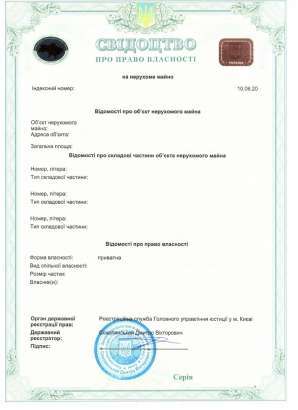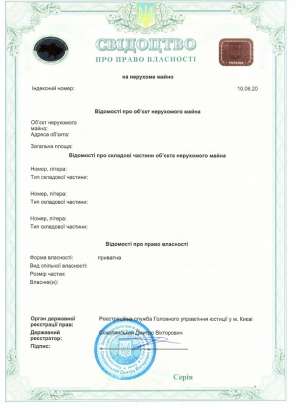Why It’s Important to Re-register an Inheritance on Time?
Cost of services:
Reviews of our Clients
... our work on joint projects assured us of your high level of professionalism
Many Ukrainians today are forced to live abroad. Some are seeking refuge after fleeing their homes due to the full-scale war, others are working, and some are simply unable to return because of health conditions or real threats. But life goes on, and with it come complex legal issues. One of them is the process of formalizing an inheritance after the death of a loved one in Ukraine.
Inheritance formalization is urgent and legally complex. However, returning home to resolve inheritance matters is often impossible or economically impractical. That’s why, in such cases, the ability to receive an inheritance remotely is not just a convenient option, but the only safe and effective solution to avoid losing what is rightfully yours.
In this article, we’ll explain the time frame for formalizing an inheritance and what changes the war has brought. Most importantly, we’ll cover why delays are dangerous and what risks and losses you may face if you miss the window to claim your inheritance.
You might also like: How to Formalize an Inheritance from Abroad?
How Has Inheritance Law Changed During the War?
The full-scale war has affected many areas of life, including inheritance law. Have the deadlines for formalizing inheritance been extended during martial law?
Yes, the legislation has changed and adapted to current realities. In particular, Clause 20 of the Final Provisions of the Civil Code of Ukraine states that during martial law and for two years after its cancellation, if the death of a person is registered more than one month after the date of death or the date they were declared deceased, the deadlines established by Articles 1269, 1273, 1276, 1277, 1283, and 1298 of this Code shall be calculated from the date of official state registration of the person’s death.
In other words, the moment of inheritance opening is considered to be the date of the deceased’s death or the date on which the person was declared deceased. This is precisely why the ability to inherit property remotely is the best option under current circumstances.
How Long Can You Delay Formalizing an Inheritance?
What is the inheritance deadline in Ukraine? Under the general rule established by Ukrainian law, you have six months from the date of the decedent’s death to decide whether or not to accept the inheritance. It’s important to understand that this is not a “re-registration period,” but specifically a deadline for expressing your intent, whether you want to accept the inheritance.
From June 29, 2022, to May 9, 2023, Ukraine allowed a 10-month period for accepting or refusing an inheritance. You may have heard about this “grace period” during martial law. However, as of 2025, this legal provision is no longer in effect.
What Happens If You Don’t Formalize an Inheritance on Time?
Delaying the formalization of an inheritance can lead to serious legal and financial consequences, significantly complicating and increasing the cost of receiving inherited property. What happens if you fail to claim your inheritance? There are several risks involved.
Loss of Inheritance Rights
If you do not submit a statement of inheritance acceptance within the time frame established by law, even accounting for the suspension of deadlines during martial law, you will be considered as having refused the inheritance. The only way to restore your right to inherit is through a court ruling, proving that there were valid reasons for the delay. This is a lengthy, complex, and costly process.
Inheritance Declared Vacant
Closely tied to the loss of inheritance rights is the concept of declaring an inheritance vacant. If there are no heirs, or none of the heirs accept the inheritance within the legally established period (including any suspension during martial law), the estate may be declared vacant by the court. As a result, the property is transferred to the territorial community where the inheritance was opened, effectively stripping you, the heir, of any rights to it.
Court Reinstatement of Deadlines
Let’s say the heir missed the deadline for accepting the inheritance. This is not uncommon. When deadlines are missed, the only path to formalizing the inheritance is through the courts. This process involves additional expenses, long waiting periods, and the need to collect evidence proving that the reasons for the delay were valid.
Debts and Obligations Transferred Along with Property
Once you’ve inherited property (for example, an apartment), you also inherit the obligations tied to it. These may include utility bills, property taxes (especially for “luxury” real estate), fines, and the deceased’s outstanding loan debts. These amounts continue to accumulate, and once the inheritance is formalized, you’ll be responsible for paying them. The longer you delay, the larger the debt becomes.
Lack of Property Protection
Without officially formalizing the inheritance, the property may remain unprotected from unlawful actions by third parties, damage, destruction, or even illegal transfer. This creates additional risks of losing or harming your inheritance.
Automatic Acceptance of Inheritance
It’s important to note that certain groups of heirs, including those who permanently lived with the deceased at the time of death, may be considered as having automatically accepted the inheritance if they did not submit an official refusal. This also applies to minor and underage children of the deceased, as well as individuals who are legally incapacitated or have limited legal capacity. However, this does not exempt them from the need to formally register their inheritance rights.
You might also like: Inheriting Without a Will: Heirs’ Rights and the Formalization Process
Legal Nuances of Formalization and Potential Challenges
The inheritance formalization process, especially when handled remotely, involves numerous legal subtleties.
For example:
- Discrepancies in documents. Differences in the spelling of surnames, first names, or patronymics—even minor inconsistencies—between the documents of the deceased and the heir can be grounds for a notary to deny the inheritance. In such cases, it’s necessary to go to court to establish the validity of ownership documents or confirm family relations.
- Debts of the deceased. By accepting the inheritance, the heir also assumes the debts of the deceased. That’s why it is crucial to thoroughly audit any potential debts before finalizing the inheritance process.
- Documents from abroad. Handling documents from abroad comes with its own set of challenges. Properly issuing powers of attorney and other documents at Ukrainian consulates/embassies abroad or through foreign notaries, followed by legalization (apostille and translation), is a complex and separate procedure. This is an essential part of exercising inheritance rights remotely.
It is extremely difficult to anticipate all these risks on your own. That’s why, under today’s circumstances, reliable legal support is not just recommended, it’s essential.
How to Safely Formalize an Inheritance from Abroad and Avoid Losing Property
If you want to formalize an inheritance remotely, we’ll take care of the entire process.
Pravova Dopomoga law firm is a team of lawyers with over 17 years of experience handling complex inheritance cases in Ukraine, including for clients living abroad.
Our services offer you a comprehensive solution, allowing you to formalize your inheritance online without delays. What do you get?
- A full legal audit of the inheritance case before starting work.
- Assistance with document preparation: powers of attorney, applications, and other paperwork, including those from abroad.
- Support at every stage: from initial consultation to the issuance of the certificate of inheritance rights.
- One-window communication: we handle the case, monitor deadlines, and stay ahead of potential issues.
With us, you won’t feel the complexity of the legal process, only the confidence that every step of your remote inheritance is handled correctly.
We work on a turnkey basis, with no unnecessary calls and no need for your physical presence. Just submit a request, and we’ll take care of the entire legal process for you.
Our clients







